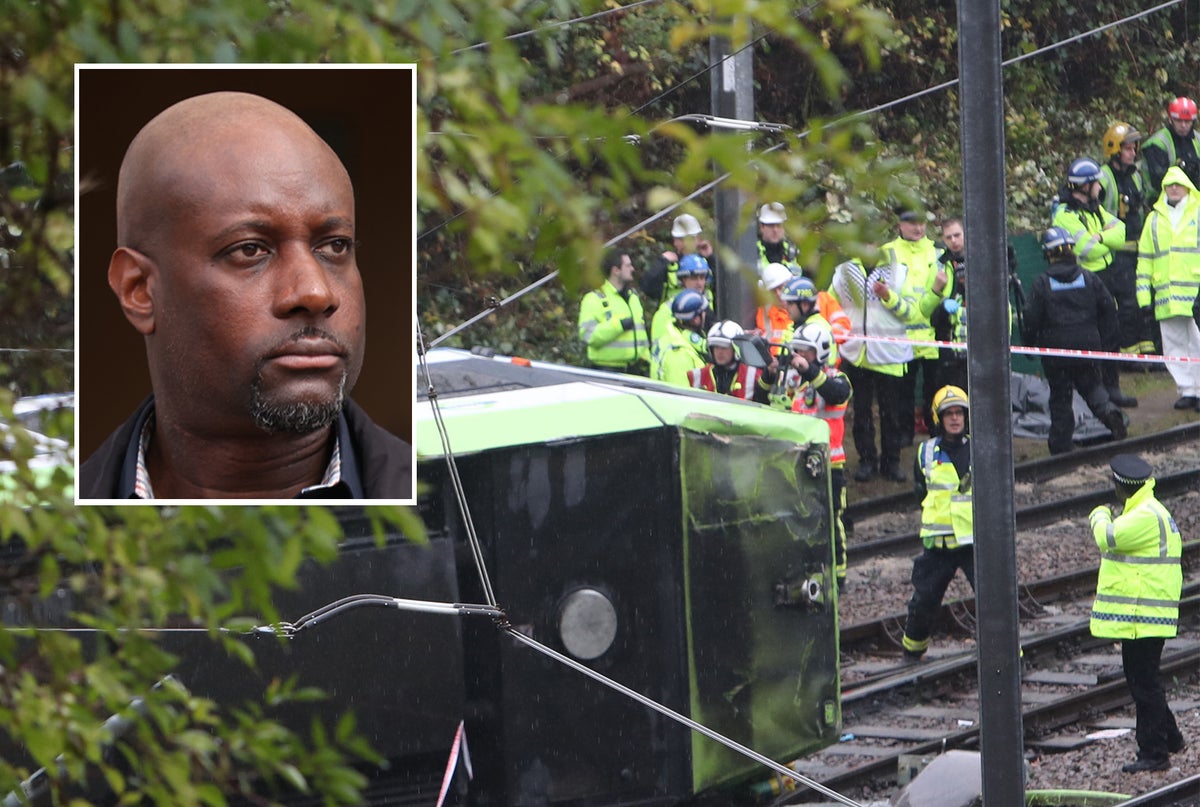
The Croydon tram disaster driver may have had a “micro-sleep” when he drove at more than three times the speed limit and derailed the tram, killing seven passengers, a court has heard.
Alfred Dorris, 49, is on trial at the Old Bailey over the crash at Sandilands in south London on 9 November 2016.
Survivors described being “flung” about as if in a washing machine or a pinball machine, then a moment of silence before screaming and shouting began.
Dorris was allegedly found with his eyes shut and one passenger called for him to “wake up”, the court heard.
According to statements, he suddenly opened his eyes and said: “I’m sorry guys, is everyone alright. I saw something in front of the tram.”
He went on to tell passengers he must have “blacked out” and “passed out”, jurors were told.
In a later interview, Dorris claimed he had become “confused” and “disorientated” and denied he had fallen asleep or suffered a blackout.
He allegedly said: “I just remember coming over all disorientated like I just weren’t sure, you know, where I was. I was confused and then I got it in my head I was going eastbound towards Lloyd Park direction.
“I was upset, confused, you know, traumatised. I weren’t sure what, to be honest with you, I wasn’t sure what actually happened. It just sort of crept up on me.”
The prosecution asserted he may have had a “micro-sleep” due to inadequate sleep at home the night before.
Dorris is accused of failing to take “reasonable care” of the health and safety of himself and his 69 passengers on Tram 2551.
Opening the case, prosecutor Jonathan Ashley-Norman KC said it was an “accident waiting to happen”.
He told jurors: “Whether by virtue of a micro-sleep, or by virtue of becoming disorientated in some other way, or a combination of the two, Mr Dorris failed to attend to the most basic of requirements of a driver of a passenger vehicle, namely remaining alert and attentive at the controls.”
The court heard it had been a wintry rainy morning when Tram 2551 embarked on its route from New Addington to Wimbledon via East Croydon.
At a sharp left turn on the approach to Sandilands, drivers are instructed to reduce speed to 20km per hour to safely negotiate the curve, with a sign on the bend confirming it, jurors heard.
But Mr Ashley-Norman said: “The tram … did not reduce speed to 20kph to enable it to take the turn safely. Instead, the tram was travelling at in excess of 70kph when it entered the turn.
“It tipped onto its side, causing those inside to be flung around as though, as one survivor put it, they were inside a washing machine.
“Windows smashed and doors were ripped off. Those who died were ejected through the broken windows and trapped between the overturned tram and the track.”
Mr Ashley-Norman said: “In a matter of seconds, tragedy was visited upon seven families who were bereaved, and many others who were seriously injured.
“For a want of attention on the part of the driver involved that morning, death and serious injury followed.”
The people who died were: Dane Chinnery, 19, Philip Seary, 57, Dorota Rynkiewicz, 35, Robert Huxley, 63, and Philip Logan, 52, all from New Addington, and Donald Collett, 62, and Mark Smith, 35, both from Croydon.
Though any one of his colleagues might have failed in the same way, nonetheless it was Mr Dorris who failed— Jonathan Ashley-Norman KC
Mr Ashley-Norman said Dorris would claim that “environmental and external factors outside his control” relating to the infrastructure around the Sandilands area combined to cause him to become “disorientated”.
The prosecutor said jurors would examine some of those factors, such as the signage on the approach to the bend and tunnel lighting.
Dorris was not solely responsible for health and safety failures at Sandilands as Transport for London (TfL) and Tram Operations Limited (ToL) had also failed in the discharge of duties, the jury was told.
Dorris was described as having an “impeccable” past record and was seen as one of the better drivers.
The prosecutor added: “Though any one of his colleagues might have failed in the same way, nonetheless it was Mr Dorris who failed.”
Dorris, from Beckenham, southeast London, denies a single charge of failing to take reasonable care at work under the Health and Safety at Work Act 1974.
The trial at the Old Bailey before Mr Justice Fraser is due to go on for up to five weeks.







